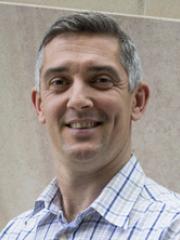Dr Nick Hudson

Teaching and Development
- AGRC2001 Agricultural biochemistry
- ANIM3061 Animal nutrigenomics and metabolism
Researcher biography
Nick is interested in fostering efficient, environmentally friendly animal production enterprises. He uses the data and capabilities provided by modern 'omics technologies to help improve breeding decisions and to inform other types of 'on farm' intervention.
Nick has a parallel interest in the development, physiology, metabolism and conservation of native Australian species, particularly frogs and butterflies.
A metabolic biochemist by training Nick has research expertise in a) the handling and biological interpretation of large, complex data sets b) molecular technologies c) mitochondrial physiology and d) metabolic flux.
Before taking his current position as a Teaching and Research academic in the School of Agriculture and Food Sustainability (AGFS) Nick worked for the CSIRO in a research intensive multi-disciplinary Systems Biology group.
While employed with the CSIRO he helped develop and apply bioinformatic methods that used metabolite, protein, RNA and DNA biotech to understand, model and predict phenotypes of commercial importance in cattle, sheep, pigs and chickens.
A research highlight from this time was the co-invention of a universal method for inferring causal molecules from genome-wide gene expression data (Hudson et al 2009. PLoS Comp Biol e1000382). This method has been applied across a diverse range of model systems including human kidney cancer (Al-Lamki et al 2020. Biology doi: 10.3390/biology9040074) and commercial traits in various agricultural species (e.g. Bottje et al 2017. BMC Syst Biol doi: 10.1186/s12918-017-0396-2).
Other notable publications have explored:
- How and why we appreciate music (Hudson 2011. BMC Res Notes doi: 10.1186/1756-0500-4-9)
- What we can learn from student evaluations of University lecturers (Reverter et al 2020. Cogent Education doi.org/10.1080/2331186X.2020.1771830)
- The functional basis of hibernation (Hudson et al 2024. J Comp Biochem Physiol doi: 10.1016/j.cbpb.2024.110952 )
- Mitochondrial systems biology (e.g. Alexandre et al 2025. Biol Open doi: 10.1242/bio.061630 and Ingham et al 2014. BMC Syst Biol doi: 10.1186/1752-0509-8-10)
- A new translatable method in population genetics (Hudson et al 2014 BMC Bioinformatics doi: 10.1186/1471-2105-15-66)
- A contribution to the debate on the safety of encoding-based Covid vaccines (Parry et al 2023. Biomedicines doi: 10.3390/biomedicines11082287)
- And the physiological and molecular basis of two of the most enigmatic, complex traits in animal production science - beef marbling (Hudson et al 2020 BMC Genomics doi: 10.1186/s12864-020-6505-4) and feed conversion efficiency (Hudson 2009. J Anim Phys Nutr doi: 10.1111/j.1439-0396.2007.00791.x).
Following an undergraduate degree in Animal Biology at the University of St.Andrews, Nick was awarded his PhD through what was then the Zoology department of the University of Queensland, after travelling from England on a Britain-Australia Society funded Northcote Scholarship.
Nick enjoys teaching various aspects of biochemistry and molecular biology to both undergraduate and postgraduate students. He highlights the main biochemical themes using the comparative method with particular emphasis placed on wildlife and production species. The importance of these various themes is illustrated through applied examples taken from agriculture, sports science, biomedicine and other areas of human endeavour.
